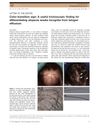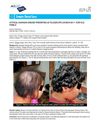 June 1989 in “Diseases of the Colon & Rectum”
June 1989 in “Diseases of the Colon & Rectum” Some patients experience temporary hair loss after ulcerative colitis surgery, likely due to illness rather than the surgery itself, and it usually grows back within six months.
January 2022 in “مجلة جامعة المجمعه للعلوم الصحية” A woman was misdiagnosed with hair loss for years, but actually had a rare type of alopecia.
 2 citations,
January 2023 in “Journal of Dermatology”
2 citations,
January 2023 in “Journal of Dermatology” Some types of hair loss can continue for a long time after recovering from a severe drug reaction known as DRESS.
 September 2023 in “medRxiv (Cold Spring Harbor Laboratory)”
September 2023 in “medRxiv (Cold Spring Harbor Laboratory)” Long-COVID has diverse, long-term health impacts, especially in young people.
 58 citations,
November 2020 in “International Journal of Dermatology”
58 citations,
November 2020 in “International Journal of Dermatology” COVID-19 may cause a temporary hair loss condition called telogen effluvium in some patients after recovery.
 12 citations,
January 1984 in “Anesthesia & Analgesia”
12 citations,
January 1984 in “Anesthesia & Analgesia” Anesthesia and surgery can cause temporary hair loss, but hair usually grows back without treatment.
 2 citations,
March 2018 in “The Journal of Dermatology”
2 citations,
March 2018 in “The Journal of Dermatology” The "color-transition sign" helps tell apart alopecia areata incognita from telogen effluvium by looking at hair color changes.
 1 citations,
October 2013 in “A & A case reports”
1 citations,
October 2013 in “A & A case reports” Hair loss from telogen effluvium may not happen again after another surgery.

A patient experienced intense hair loss due to telogen effluvium after scalp contact dermatitis, but hair regrew completely within two months without further treatment.
 18 citations,
January 2016 in “Skin appendage disorders”
18 citations,
January 2016 in “Skin appendage disorders” The paper suggests improving diagnosis and treatment of telogen effluvium but does not recommend a new classification system.
 16 citations,
October 2004 in “Acta dermato-venereologica”
16 citations,
October 2004 in “Acta dermato-venereologica” Two people lost a lot of hair because of epilepsy drugs, but their hair grew back after changing medication.
 10 citations,
January 2017 in “Skin appendage disorders”
10 citations,
January 2017 in “Skin appendage disorders” Emotional stress can trigger intermittent hair loss in chronic telogen effluvium, which may not improve with treatment if stress continues.
 8 citations,
January 2015 in “International journal of trichology”
8 citations,
January 2015 in “International journal of trichology” A woman's total hair loss was linked to a Borrelia infection and was reversed with appropriate treatment.
 7 citations,
October 2019 in “Clinical, Cosmetic and Investigational Dermatology”
7 citations,
October 2019 in “Clinical, Cosmetic and Investigational Dermatology” Certain gene variations in the Vitamin D receptor may increase the risk of chronic hair loss.
 1 citations,
January 2018 in “Acta dermatovenerologica Alpina, Pannonica et Adriatica (Tiskana izd.)”
1 citations,
January 2018 in “Acta dermatovenerologica Alpina, Pannonica et Adriatica (Tiskana izd.)” The herbal extract was found to effectively reduce and prevent hair loss without any side effects.
 May 2024 in “Pakistan Journal of Health Sciences”
May 2024 in “Pakistan Journal of Health Sciences” Iron deficiency is linked to hair loss in CTE patients.
 May 2021 in “Journal of the American College of Cardiology”
May 2021 in “Journal of the American College of Cardiology” An 11-year-old girl with Kawasaki disease experienced hair loss that improved after treatment.
 162 citations,
August 2004 in “Journal of Investigative Dermatology”
162 citations,
August 2004 in “Journal of Investigative Dermatology” Hair loss causes stress and affects mental health; treatment and support needed.
 72 citations,
October 2010 in “Journal of The American Academy of Dermatology”
72 citations,
October 2010 in “Journal of The American Academy of Dermatology” Iron deficiency common in women, not always linked to hair loss; more research needed.
 64 citations,
November 2008 in “Journal of The American Academy of Dermatology”
64 citations,
November 2008 in “Journal of The American Academy of Dermatology” A new type of rapid hair loss called ADTA usually gets better on its own within 6 months.
 47 citations,
July 2005 in “British Journal of Dermatology”
47 citations,
July 2005 in “British Journal of Dermatology” Topical vitamin D3 does not prevent hair loss from chemotherapy.
 35 citations,
November 2020 in “Dermatologic Therapy”
35 citations,
November 2020 in “Dermatologic Therapy” Severe COVID-19 may cause hair loss, and doctors recommend supplements and topical treatments to manage it.
 31 citations,
April 2010 in “British journal of dermatology/British journal of dermatology, Supplement”
31 citations,
April 2010 in “British journal of dermatology/British journal of dermatology, Supplement” Frontal fibrosing alopecia can cause sudden hair loss on limbs, similar to scalp hair loss.
 12 citations,
July 1979 in “International Journal of Dermatology”
12 citations,
July 1979 in “International Journal of Dermatology” A patient with zinc depletion improved after zinc supplementation during parenteral nutrition.
 10 citations,
August 2021 in “Journal of Cosmetic Dermatology”
10 citations,
August 2021 in “Journal of Cosmetic Dermatology” Most patients with telogen effluvium had low iron and vitamin D levels; iron supplements were commonly prescribed.
 10 citations,
January 2015 in “Journal of Dermatology and Dermatologic Surgery”
10 citations,
January 2015 in “Journal of Dermatology and Dermatologic Surgery” Hair loss in adult females in Makkah is often linked to iron-deficiency anemia and thyroid issues.
 7 citations,
June 2021 in “JAAD Case Reports”
7 citations,
June 2021 in “JAAD Case Reports” A woman had hair loss, nail changes, and skin peeling after a COVID-19 infection, which got better on their own.
 6 citations,
January 2021 in “Journal of Cosmetic Dermatology”
6 citations,
January 2021 in “Journal of Cosmetic Dermatology” Poor sleep during the pandemic may increase stress and worsen hair loss conditions.
 3 citations,
May 2019 in “Australasian Journal of Dermatology”
3 citations,
May 2019 in “Australasian Journal of Dermatology” Hair loss in Cronkhite-Canada syndrome may be caused by autoimmune factors, not just stress or malabsorption.
 2 citations,
August 2020 in “Dermatologic Therapy”
2 citations,
August 2020 in “Dermatologic Therapy” Low ferritin and zinc levels, as well as anemia, are linked to more severe hair loss in Egyptian children with chronic hair shedding.




























